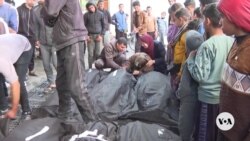Israeli Prime Minister Benjamin Netanyahu’s office said Monday the Israeli military has given his war Cabinet a plan to evacuate hundreds of thousands of Palestinians from southern Gaza ahead of a planned ground attack on Hamas militants in Rafah but gave no indication where they would be sent.
The United States, Israel’s chief ally in its nearly five-month war against Hamas, has warned Israel against a ground offensive in Rafah, just north of the Gaza border with Egypt, without first safely evacuating the Palestinians sheltering there. Netanyahu says a subsequent attack on Hamas militants there could allow Israel to win the war within weeks.
Monday’s statement did not give any details about where Israel plans to send the Palestinians and Egypt has said it will not open its borders. Much of Gaza, the narrow territory along the Mediterranean Sea, has been leveled during Israel’s massive counteroffensive after the October 7 Hamas terror attack killed 1,200 people in Israel.
Nearly 30,000 Palestinians have been killed in Gaza, the majority women and children, according to the Hamas-run Gaza health ministry. Israel says it has killed 12,000 Hamas fighters.
The United Nations has expressed concern about any plan to move the civilian population from southern Gaza and about Israeli plans to launch an offensive in the area populated by people already in need of humanitarian aid.
U.N. Secretary-General Antonio Guterres said Monday that humanitarian assistance in Gaza remains “completely insufficient,” and that an Israeli offensive in Rafah would greatly harm those efforts.
"An all-out Israeli offensive on the city would not only be terrifying for more than a million Palestinian civilians sheltering there; it would put the final nail in the coffin of our aid programs," Guterres said.
Israel reported Monday that it killed dozens of militants in the Zeytoun area, east of Gaza City in the northern part of the Gaza Strip, as well as in Khan Younis in southern Gaza.
The Israeli military also said Monday it was carrying out strikes “deep in Lebanon” targeting the militant group Hezbollah. Security sources said the strikes targeted sites near the city of Baalbek, with Hezbollah saying two people were killed.
Israel and Hezbollah, a Hamas ally, have traded fire across their border throughout the war, which helped fuel fears of a widening conflict in the Middle East.
Earlier Monday, Israel said a missile intercepted one of its drones as it flew over Lebanon. Hezbollah said its air defense had shot down the Israeli drone.
While the warfare rages on, U.S., Israeli, Egyptian and Qatari officials are meeting in Qatar to try to negotiate a weekslong cease-fire and the release of some of the 100 or so hostages Hamas is still holding from among the 240 it captured in the October attack.
About 100 hostages were released during a weeklong cease-fire in November. The Israeli military says it believes about 30 hostages held by Hamas have subsequently died or been killed in Gaza.
Palestinian Prime Minister Mohammed Shtayyeh announced his resignation Monday.
“The next stage and its challenges require new governmental and political arrangements that take into account the new reality in the Gaza Strip,” Shtayyeh said at a Cabinet meeting.
The Palestinian Authority governs part of the Israeli-occupied West Bank and lost power in Gaza to Hamas after a power struggle in 2007.
Some information for this report came from The Associated Press, Agence France-Presse and Reuters.







